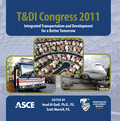Use of Fractional Order Viscoelastic Models to Characterize Asphalt Concrete
Publication: Transportation and Development Institute Congress 2011: Integrated Transportation and Development for a Better Tomorrow
Abstract
The paper presents the application of fractional viscoelastic models to characterize viscoleastic properties of asphalt concrete. This implies the replacement of integer order derivatives in the constitutive equations with fractional derivatives. Integer order stress and strain derivatives lead to exponential relaxation and typically a large number of Maxwell or Kelvin elements are needed to characterize the full viscoelastic response range. In each case, the representation is not unique and the parameters cannot be linked to the composition of asphalt concrete. Fractional models lead to non-exponential relaxation making it possible to characterize the full viscoelastic response range with a small number of elements (typically 1 or 2). As such, the representation is unique and can be linked to the composition of asphalt concrete. Fractional models can also be used to construct the dynamic modulus master curve. As Witczak's sigmoidal model is a simple curve fitting it has no real physical meaning. Fractional models on the other hand have physical meaning, uniquely define the creep compliance and relaxation modulus, and allow better analysis of the physics of the relaxation process by considering the storage modulus, the loss modulus, and the phase angle. Using fractional models to analyze experimental asphalt concrete dynamic modulus results suggested two distinct relaxation processes; one at low temperatures and another at high temperatures. A possible explanation for this behavior can be attributed to the composition of asphalt concrete; at low temperatures, the binder behaves as a viscoelastic solid with aggregate particles more or less securely tied to the binder. The relaxation process is therefore restricted to the binder. At high temperatures, the binder behaves more as a viscoelastic fluid allowing aggregate particles to slide past each other which introduces another aspect of the relaxation process.
Get full access to this article
View all available purchase options and get full access to this chapter.
Information & Authors
Information
Published In
Copyright
© 2011 American Society of Civil Engineers.
History
Published online: Apr 26, 2012
ASCE Technical Topics:
- Asphalt concrete
- Binders (material)
- Composite materials
- Dynamic modulus
- Engineering fundamentals
- Engineering materials (by type)
- Fiber reinforced composites
- Material mechanics
- Material properties
- Materials characterization
- Materials engineering
- Measurement (by type)
- Mechanical properties
- Relaxation (mechanics)
- Rheology
- Stress (by type)
- Structural analysis
- Structural engineering
- Temperature effects
- Temperature measurement
- Viscoelasticity
Authors
Metrics & Citations
Metrics
Citations
Download citation
If you have the appropriate software installed, you can download article citation data to the citation manager of your choice. Simply select your manager software from the list below and click Download.
